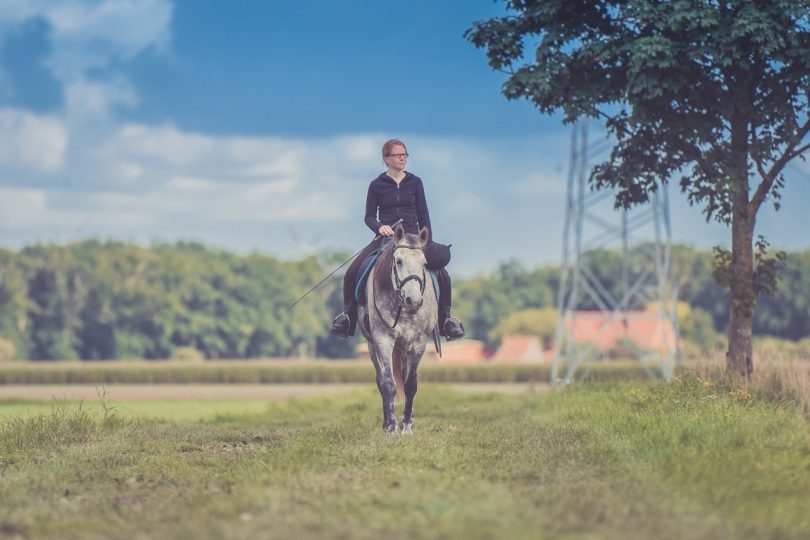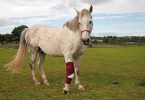Most people simply accept the fact that horses are shod and rarely ask the question – why? When you think about it, it is a rather interesting question. After all, wild horses don’t need them. So, using this as a standard, do horses even need shoes? To really understand the answer to this, let’s delve into the topic a little deeper.
To give you a quick idea, though, here are the main reasons that horses need to wear shoes:
- Breeding as a result of domestication
- Different walking surfaces
- Intermittent exercise
- Living conditions
To further learn about why horses need shoes, keep reading.
Shoes Protect Soft Hooves Caused by Breeding
The domestication of horses had an enormous impact on human civilization. Horses made it easier for people to travel, transport objects, and engage in farming. Due to this, humans were very selective in the way they bred horses. They mainly focused on passing down the genes for strength, speed, and endurance.
Now, what people were less interested in (or unaware of) was hoof strength. Due to this, domesticated horses had a greater chance of producing horses with softer hooves. As you can imagine, these softer hooves were more likely to split or get damaged in the long-term. Therefore, shoes were introduced to safeguard the horses’ hooves.
Shoes Can Counteract Numerous Diseases
The truth is that not all horses are born healthy. Some are simply born with hoof issues that result in hooves that are excessively soft or prone to disease. In such instances, shoes can be used as protective coverings to either correct the problem or prevent future medical conditions.
Even if your horse is healthy, they may contract certain conditions like laminitis, navicular syndrome, seedy toe, and white line disease. In many of these cases, the only treatment is proper shoeing. Shoeing can correct the damage caused by these conditions or help maintain hoof health.
Shoes Protect Hooves from Tough Surfaces
Modern horses are also more likely to have to walk on harder surfaces than their counterparts. Just think about it, wild horses ran around on dirt and mud. Domesticated horses, on the other hand, may have to walk on concrete, tarmac, or stony ground. At the very least, they will have to gallop on compacted dirt.
When you combine these conditions with softer hooves, the results aren’t great. Horses walking on these surfaces are more likely to experience splintered hooves. Well-shod horses, however, are able to protect their feet from the strain and pressure of walking on hard surfaces. Since these shoes act as a protective covering, their hooves are safe from taking the brunt of the pressure.
Shoes Compensate for Less Exercise
It is an accepted fact that most domestic horses get far less exercise than wild horses. Now, while it may seem like their hooves should benefit from this, this isn’t the case. See, lots of exercise is important for horses, and particularly their hooves.
For one thing, more exercise means greater blood flow to the hooves. In turn, there are more nutrients being transported here, resulting in healthier, tougher hooves. For another, exercise helps to gently toughen up the horse’s hooves. Over time, the hooves will thicken and toughen, making them less brittle. Since more exercise isn’t always an option for many horse owners, the next best thing is shoes.
Shoes Safeguard Hooves from Ammonia
So, what is your horse doing if he or she isn’t exercising? Well, they would be standing around in their stable. This, of course, means that your horse’s hooves are being exposed to ammonia fairly regularly. See, regardless of how clean you keep their stalls, there is always going to be horse urine on the floor. Since ammonia is found in urine, the hooves of your horse will make contact with it fairly frequently.
Ammonia has corrosive properties and can slowly break down the hardened portion of the hoof. Not to mention, it can cause a variety of other health issues. Fortunately, horseshoes are tough and thick enough to prevent the ammonia from reaching the hooves.
Are There Downsides to Shoeing Horses?
There are some horse owners who are set against shoeing their horses. Their logic is that as long as you take care of your horse and their hooves, shoeing isn’t actually necessary. Now, there is some truth to this. Most wear and tear and even medical conditions can be prevented through proper nutrition, grooming, and trimming.
However, in many instances, horseshoes do more good than harm. That is, provided that you take your horse to a skilled and experienced farrier. It is only then that you will be able to ensure that the shoes are fitted properly and that your horse doesn’t feel anything at all.
When Do Horses Need Shoes?
If you are on the fence about whether or not your horse needs shoes, check the below list for guidance. If any of these statements apply to your horse, then they will probably be better off with shoes:
- The horse was born with conformational balance problems
- The foal is born with anatomical deformities
- Has poor hoof growth
- Is heavy and walks on rough surfaces
- Has a history of laminitis
- Has a history of Cushing disease or metabolic disorder
When Are Shoes Not Necessary
If you don’t think that your horse actually needs shoes, you can get confirmation for this below. If you think these factors don’t apply to your horse, then it may not be necessary for you to get shoes for them:
- Your horse has a healthy, balanced diet
- Gets enough exercise
- Is groomed and taken care of regularly
- Walks mostly on soft ground
- Doesn’t need to put up with wet conditions
The information here should answer the question of just why horses need shoes. As you can see, it is a multi-layered response – there are specific reasons why owners take this route.
Now that you are aware of them, you may be better equipped to know what is right for your own horse.






